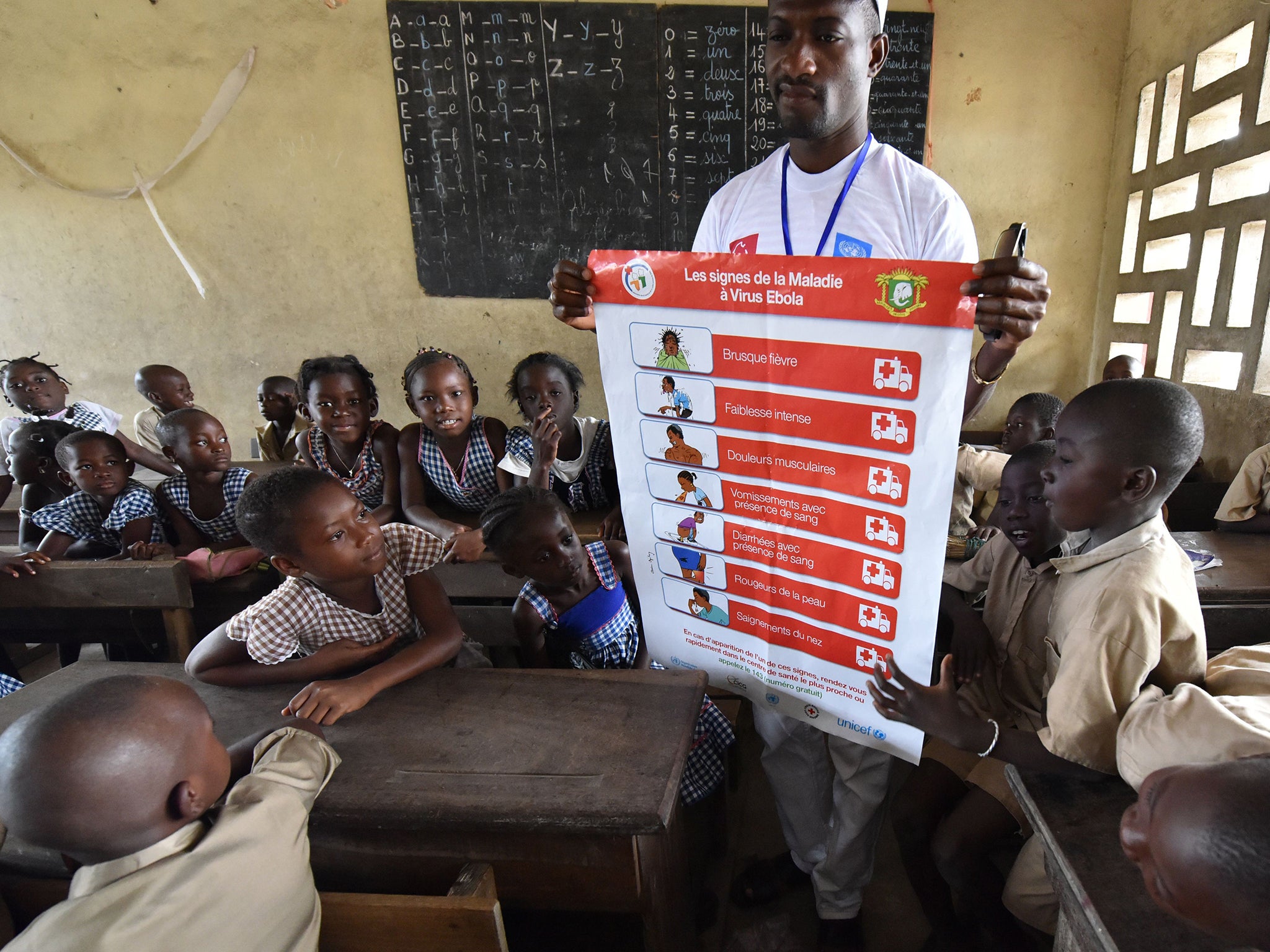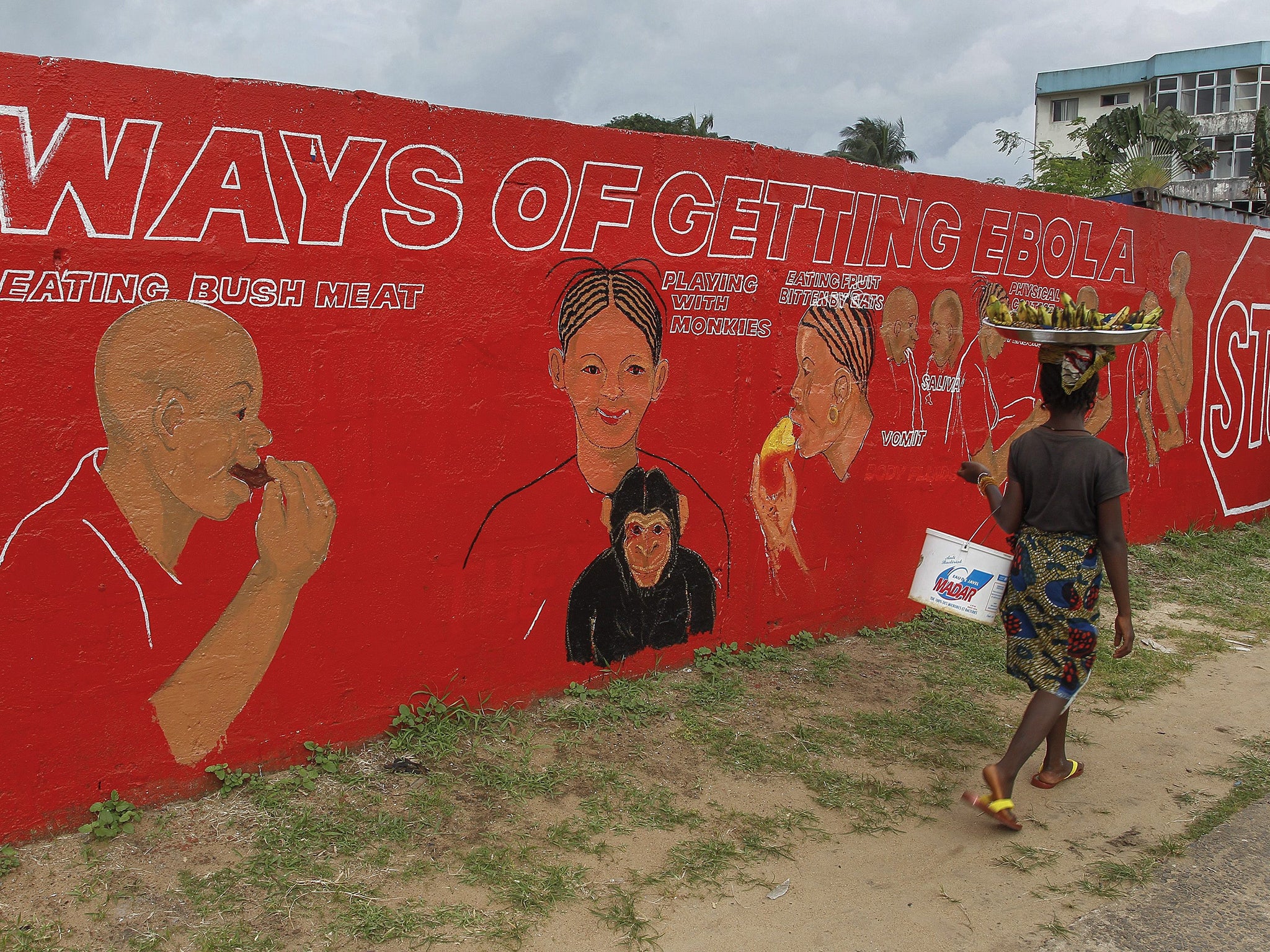The powerhouse of West Africa waits for Ebola to strike
Ivory Coast is using the wealth its poorer neighbours lack to keep the epidemic on the other side of its borders. If it fails, the whole region will feel the economic consequences

The billboard depicts a masked health worker in a biohazard suit looming over a bed-ridden patient. Above them, bright red letters warn commuters on a busy street in Abidjan, Ivory Coast, that: “The Ebola risk is always there.”
As the country tries to fend off an Ebola outbreak ravaging neighbouring West African states, such grim reminders of the catastrophe unfolding across its western border are everywhere. The worst recorded outbreak of the virus has killed more than 2,622 people in Liberia, Sierra Leone and Guinea and has also spread to Nigeria and Senegal. Yesterday it was confirmed there were 5,335 cases diagnosed, though that figure may be inaccurate as most patients are at home – and infecting others in the community – not in hospital.
If Ebola reaches Ivory Coast, the powerhouse of French-speaking West Africa, the economic consequences could be huge. The country exports 40 per cent of the world’s cocoa – the raw material for chocolate – and supplies its landlocked neighbours with everything from rice to fuel. The country is therefore taking the kind of aggressive anti-infection measures which its poorer, smaller western neighbours were slow to adopt. Handwashing stations have appeared at government buildings and office towers in Abidjan. People have also abandoned the traditional three-kiss greeting.
The government has sent mass text messages to the public and children, exposed to warnings on radio and television, quarantine their classmates in a playground game they call “Ebola”. “It’s without precedent,” said Daouda Coulibaly, who is leading the effort. “We started back in March to explain to people that this is a real disease. It must be taken seriously.”
The World Health Organisation (WHO) has already warned that several neighbouring countries are at risk. With the outbreak gathering pace, the WHO has said a $1bn international response will be needed to keep the number of those infected within the “tens of thousands”.

Now, a black market for the blood of survivors is emerging. Convalescent serum – collected from someone who has survived an infectious disease – has been used to treat Ebola victims. Most recently, it was given to 51-year-old American aid worker Rick Sacra from a survivor, Kent Brantly. Blood from Ebola survivors is rich with antibodies and since there is currently no approved drug to fight it, some have become desperate enough to turn to the black market for the serum. The WHO is increasingly concerned about the trade, since giving a patient someone else’s blood can cause anaphylactic shock and death or infect them with other diseases such as HIV. Dr Margaret Chan of the WHO, said: “We need to work very closely with the affected countries to stamp out black market trading of convalescent serum for two reasons; because it is in the interest of individuals not to just get convalescent serum without going through the proper testing because it is important that there may be other infectious vectors. We will certainly bring this to the attention of governments and work with them to stamp out any black market activity.”
“The epidemic... is outpacing our attempts to control it,” said Marc Poncin, head of emergency response for medical charity Médecins Sans Frontières in Guinea. “Ivory Coast is the country most at risk. It’s probably a question of time before it appears [there].”
Though the country has yet to register a single case, at least two international conferences due to take place in Ivory Coast have been cancelled. International cocoa exporters have restricted staff movements in the country.
Citizens of Abidjan are wary. On packed public buses, people try to avoid touching.
“It’s often difficult because you can’t avoid human contact,” said student Cesar Kouame Kouakou. “But we try to do it because no one knows what causes this sickness.” The US has pledged to send 3,000 troops to Liberia to help. The plan includes establishing a regional command and control centre in the capital, Monrovia, building 17 treatment centres with 100 beds each, and training healthcare workers. A planeload of hospital equipment from the US is due to arrive today, the first of 13 such shipments headed for Monrovia, carrying equipment for a new hospital.
Liberia, which was founded in the 19th century by descendants of freed American slaves, has welcomed assistance from its long-time ally. “Ebola will not defeat us; never. We have faced great tragedies before. These have... shown our true character,” said President Johnson Sirleaf, referring to a 1989-2003 civil war in which up to a quarter of a million people died. “I call on you to stand up again. We are fighting back and we will win.”
Meanwhile, William Pooley, the British nurse who survived Ebola, has gone to the US to donate blood to an American still battling the disease. The Foreign Office said it had arranged for Mr Pooley to get an emergency passport to fly quickly to the US. His original passport was burned as part of efforts to stop the disease.
Sierra Leone’s population has been asked to stay at home. Volunteers will go house to house with information about Ebola and will also look for unreported cases.
Additional reporting by Daniel Flynn in Monrovia, Reuters
Join our commenting forum
Join thought-provoking conversations, follow other Independent readers and see their replies
Comments